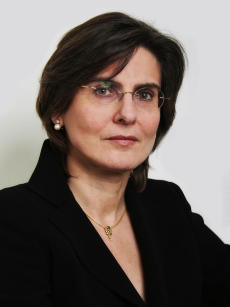Sigmund Freud Prize for Biography on Maria Theresa
German Academy for Language and Literature honours historian Stollberg-Rilinger

Historian Prof. Dr. Barbara Stollberg-Rilinger of the Cluster of Excellence “Religion and Politics” receives the Sigmund Freud Prize for Academic Prose (Sigmund-Freud-Preis für wissenschaftliche Prosa) 2017 from the German Academy for Language and Literature (Deutsche Akademie für Sprache und Dichtung). With her biography Maria Theresa. The Empress in her Times (Maria Theresia. Die Kaiserin in ihrer Zeit), the scholar has “produced the leading representation of Empress Maria Theresa and her times” the jury explains. In her book, The Emperor's Old Clothes: Constitutional History and Symbolic Language of the Old Empire (Des Kaisers alte Kleider. Verfassungsgeschichte und Symbolsprache des Alten Reiches), she is thought to have designed “a new image of the early modern Holy Roman Empire as well as its constitution, which had been realised in symbols and rituals”. Her style combines “dry wit and conceptual accuracy. Punditry, clarity and a passion for narration make her books an intellectual reading pleasure”. The prize is endowed with 20,000 euros and will be awarded on 28 October jointly with the Georg Büchner Preis in Darmstadt, as announced by the Academy.
The Sigmund Freud Prize for Academic Prose was first awarded in 1964. It is granted to scholars who publish in German and contribute decisively to the development of language usage in their fields of study through excellent linguistic style. Among the previous awardees are Arabist Angelika Neuwirth, legal scholar and former constitutional judge Ernst-Wolfgang Böckenförde, theologians Karl Rahner and Karl Barth, philosopher Hannah Arendt, Egyptologist Jan Assmann as well as the Münster philosopher Hans Blumenberg, name giver for the “Hans Blumenberg Visiting Professorship for Religion and Politics” of the Cluster of Excellence. The prize is sponsored by the Entega foundation.
“Maria Theresa embodies a myth”
Since 1997, the early modern period historian Barbara Stollberg-Rilinger has held the Professorship of Early Modern History at the Westfälische Wilhelms-Universität Münster (WWU). In 2005 she received the Gottfried Wilhelm Leibniz Award of the Deutsche Forschungsgemeinschaft (DFG) and in 2013 the Award of the Historical Collegium of the Bavarian Academy of Sciences and Humanities. From 2011 until 2015 she was the spokesperson of the Cluster of Excellence “Religion and Politics” of Münster University and since then has been deputy spokesperson. Within the research association, she heads the project B2-22 “Beyond Confessional Clarity: On the Discursive Formation of Heterodox Groups in the Early Modern Period”. The biography of Maria Theresa is, amongst others, the result of a fellowship at the Institute for Advanced Study Berlin (Wissenschaftskolleg zu Berlin) from 2015 until 2016. The historian's book also won the 2017 Non-Fiction Prize at the Leipzig Book Fair.
In the biography on Empress Maria Theresa (1717-1780), which was published on the occasion of her 300th birthday, the historian refutes many clichés about one of the most powerful women in history. “Maria Theresa embodies a myth that was to remind Austria of lost greatness for a long time, but this spell must be broken today”, says the author. “The myth describes Maria Theresa as a sovereign of people’s hearts who loved her children and her subjects, as a heroine who defended right against power, as a pious regent who strengthened the practice of religion, as a respectable civil ‘housewife of the empire’ who cleared up the privileges and stiff ceremony at the royal court, and as the founder of the modern administrative state. However, many of these stereotypes can no longer be supported.” The historian proves them wrong and relies on many, still partly unknown sources. Her book is published by C.H.Beck and was positively acclaimed by numerous national and international media. (Deutsche Akademie/ill/vvm)

